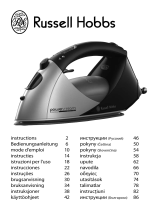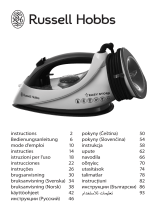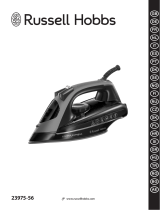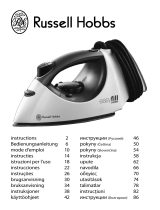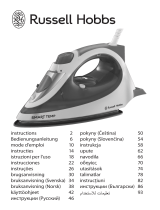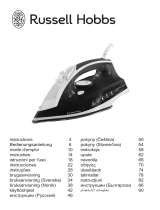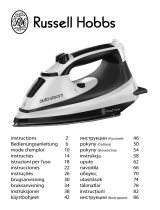
4
temperature setting guide
label marking temperature setting
j cool – nylon, acrylics, polyester •
k warm – wool, polyester mixtures ••
l hot – cotton, linen •••/max
i do not iron
, If the instructions on the fabric label differ from this guide, follow the instructions on the
label.
h STEAM IRONING
21 If you intend to use steam, the temperature setting must be S or higher.
22 Set the steam control to the setting you want (S = no steam, # = high).
23 Wait till the light goes off, then start ironing.
k SPRAY
, Water spotting affects some fabrics. Test this on a hidden part of the fabric.
24 Lift the iron off the fabric.
25 Aim the spray nozzle at the fabric.
26 Press the * button.
27 You may have to press it 2 or 3 times to pump water through the system.
j SHOT OF STEAM
28 If you intend to use steam, the temperature setting must be S or higher.
29 If you don’t, you’ll get water on your clothes, not steam.
30 Lift the iron off the fabric.
31 Press the # button.
32 A burst of steam will issue from the steam vents in the tip of the soleplate.
33 You may have to press it 2 or 3 times to pump water through the system.
34 Leave 4 seconds between shots, to let the steam build up.
n DRY IRONING
, If you’re going to be dry ironing for 20 minutes or more, empty the reservoir first, to avoid
spontaneous bursts of steam.
35 Set the steam control to S.
36 Wait till the light goes off, then start ironing.
l VERTICAL STEAMING
37 Remove wrinkles from hanging clothes, hanging curtains, and furnishing fabrics.
38 Check that there is adequate ventilation behind the fabric, otherwise moisture may build up,
causing mildew.
39 Check that there is nothing behind the fabric that may be damaged by the steam.
40 Check that pockets, turn-ups, and cuffs are empty.
41 Set the temperature control to max. Set the steam control to S.
42 Lift the iron off the fabric.
43 Press the # button.
44 A burst of steam will issue from the steam vents in the tip of the soleplate.
45 You may have to press it 2 or 3 times to pump water through the system.
46 Leave 4 seconds between shots, to let the steam build up.
C AFTER USE
47 Set the temperature control to •. Set the steam control to S.
48 Unplug the appliance.
49 Press the V button, and keep it pressed in. This opens the valve
50 Hold it over a sink, turn it upside down, and drain the water from the reservoir, via the water
inlet.




